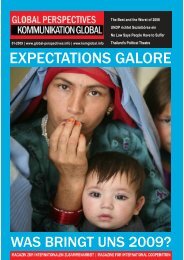GLOBAL PERSPECTIVES | Second Quarterly 2013 â North America ...
GLOBAL PERSPECTIVES | Second Quarterly 2013 â North America ...
GLOBAL PERSPECTIVES | Second Quarterly 2013 â North America ...
Create successful ePaper yourself
Turn your PDF publications into a flip-book with our unique Google optimized e-Paper software.
<strong>GLOBAL</strong> <strong>PERSPECTIVES</strong> - FIRST QUARTERLY <strong>2013</strong><br />
MIDDLE EAST<br />
Syria: Enough is Enough<br />
By Jayantha Dhanapala*<br />
KANDY - The two-year-old conflict in Syria rages on with the embattled dictatorship of Bashar al-Assad and his<br />
Ba’ath Party withstanding the attacks of a motley group of rebels supported by the West and by the money bag<br />
monarchies of Saudi Arabia and Qatar with Israel not far behind. Dictatorships - whether unelected, elected or<br />
inherited – are of course unacceptable in this day and age when the palpable consent of a sovereign people is paramount<br />
for the governance of independent countries. However, no regime change by self-appointed guardians of<br />
democracy from abroad can replace a genuine movement for change by the people, of the people and for the people.<br />
Applicable international law, even in<br />
the implementation of the controversial<br />
'Responsibility to Protect' doctrine, is<br />
very clear on this – only the Security<br />
Council can take action in the name of<br />
maintaining international peace and<br />
security. The tenth anniversary of the<br />
infamously illegal invasion of Iraq for<br />
the purpose of regime change and on<br />
the false pretext of eradicating weapons<br />
of mass destruction was recently observed<br />
by massive bombings and bloodletting<br />
in Iraq with a weak government<br />
presiding over a faction-ridden country<br />
coping with unbridled violence. Is that<br />
the future that awaits Syria?<br />
The Syria imbroglio differs from the<br />
Iraqi one in a number of ways. It<br />
emerged at the time of the Arab Spring<br />
when Tunisia first and then Egypt, Yemen, Syria, Bahrain,<br />
Libya and other Arab countries saw the people rise spontaneously<br />
against dictatorial regimes with whom the West<br />
and the rest of the world had been content to have normal,<br />
and even cozy, relations.<br />
The West supported these popular uprisings selectively.<br />
Tunisia’s revolt was autonomous and did not need foreign<br />
assistance to succeed. In the case of Libya, Gaddafi’s resistance<br />
was soon swept away when the Western powers<br />
in the Security Council exploited voting abstentions by<br />
Russia and China to empower NATO to enter the battle.<br />
Libya, post Gaddafi today, remains divided by factions and<br />
is dangerously unstable. The revolt in Bahrain was suppressed<br />
because the Saudis supported the unpopular ruler<br />
there. Syria was the next target and this suited Israel’s<br />
agenda since it was on Israel’s border and Syrian territory<br />
on the Golan Heights remains occupied by Israel.<br />
The Arab world was divided in supporting the Syrian regime,<br />
which comes from the 12% Alawite sect of the Shias<br />
in Syria where the Sunnis and Kurds demand power sharing<br />
as in Iraq. The Arab League suspended the Syrian regime<br />
and later gave the Syrian National Coalition that seat<br />
in its body. The fact is that a heterogeneous collection of<br />
groups including the Jihadist Jabbahal-Nusra<br />
and other extremist groups<br />
suspected of Al Qaeda links are benefiting<br />
from arms supplied by the<br />
Western supporters and the wealthy<br />
Saudi and Qatari financiers of the<br />
rebel groups.<br />
Regional rivalry<br />
The regional rivalry between the<br />
Saudis and the Qataris has complicated<br />
the Syrian problem. Syria is the<br />
linchpin of the Middle East and its<br />
complex religious and ethnic mix can<br />
affect the whole region if it unravels.<br />
In the past the connection between<br />
Lebanon and Syria was well established<br />
but today the links between<br />
Syria and the Middle East region are<br />
far wider and deeper. The explicit support for the Syrian<br />
regime by the Hezbollah is sufficient to ensure Israeli and<br />
Western opposition to continue and reports of Israeli missile<br />
attacks on Syria are no surprise. The Syrian regime has<br />
suffered a number of defections at senior military, official<br />
and diplomatic levels. At the international level Russia<br />
remains the main supporter and arms supplier of the Assad<br />
regime. After the bitter lesson of the Libyan episode, Russia<br />
and China have vetoed any move by the West to obtain<br />
Security Council approval for action on Syria.<br />
The humanitarian cost of the war has been enormous. The<br />
heads of humanitarian agencies in the UN system took the<br />
unusual step of coming out with a joint statement urging a<br />
political solution saying “Enough, enough…. We, leaders of<br />
U.N. agencies charged with dealing with the human costs of<br />
this tragedy, appeal to political leaders involved to meet<br />
their responsibility to the people of Syria and to the future<br />
of the region.” <br />
*Jayantha Dhanapala is currently President of the 1995 Nobel<br />
Peace Prize recipient the Pugwash Conferences on Science<br />
& World Affairs, a former UN Under-Secretary-General<br />
and a former Ambassador of Sri Lanka.<br />
- 27 -















